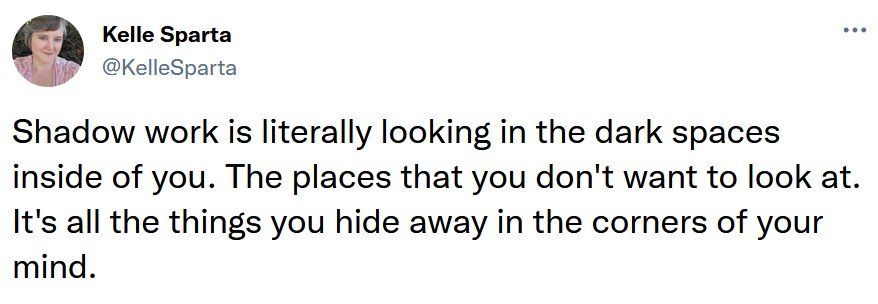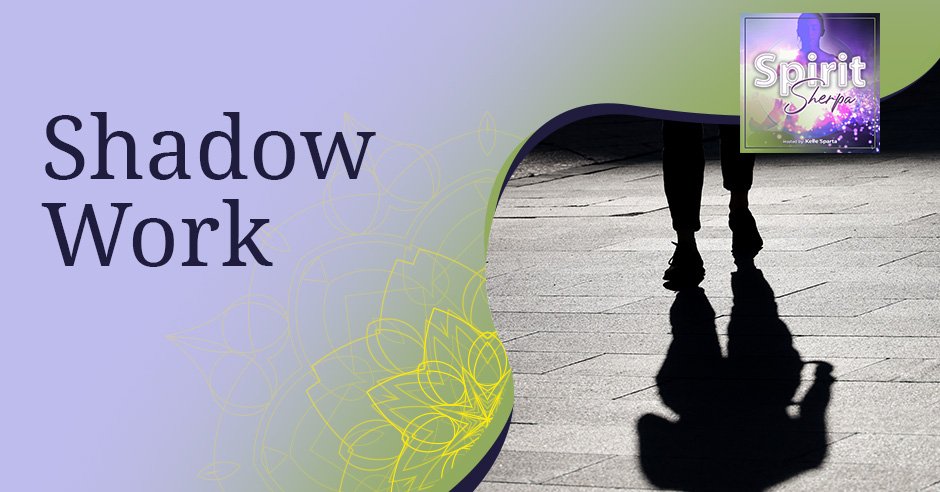In this episode, Kelle answers a question from Spirit Sherpa listener Bethany regarding doing our personal shadow work. Kelle explains what shadow work is and how to begin the process of embarking on the sometimes harrowing journey through the shadows. Kelle gives us some things to look out for as well as times to pull away when things go from productive to dangerous.
References:
–For more information about Kelle Sparta or Kelle Sparta Enterprises:
https://spiritualcoachcertification.us/learn-more-about-kelle/
–Driveabout (Full Version) https://youtu.be/biD21gy6qZk
–Written by: Kelle Sparta
–Performed by: Kelle Sparta and Daniel Singer
–Produced by: Daniel Singer
-For more information about Joe Caliendo Jr (Joey C) or Honu Voice Productions:
-Email: joeyc@honuvoice.com
-Facebook: https://www.facebook.com/HonuJoeyC/
Keywords:
spirit guides, spiritual guidance, spiritual therapist, spiritual counseling near me, spiritual therapist near me, types of spirit guides, 7 spiritual laws, metaphysical properties, finding your spirit guide, contacting your spirit guide, list of spirit guides, contacting spirit guides, my spirit guide, spiritual guidance near me, spiritual energy healing, spirit guides and angels, spiritual guide near me, a spirit guide, spiritual marriage counseling, angel spirit guides, spiritual psychotherapy, free spiritual guidance, spiritual healing therapy, angels and guides, the spirit guide, your spirit guide, metaphysical healing, channeling spirit guides, spirit guides in dreams, meeting spirit guides, asking spirit guides for help with love, spiritual healing hands, shaman spirit guide, spiritual guidance counselor, psycho spiritual therapy, understanding spirit guides, metaphysical properties of, spirituality guidance, i need spiritual guidance, spirituality and psychotherapy, master spirit guide, guide to spiritual awakening, spiritual couples counseling, Kelle Sparta, The Spirit Doctor, Spirit Sherpa, Spirit, Spiritual Life, Manifestation, Magick, Realms, Shaman, Shamanism, Wicca, Paganism, Life Transformation, Personal Journey
Credits and Licensing:
“Spirit Sherpa” is the sole property of Kelle Sparta Enterprises and is distributed under a Creative Commons: BY-NC-ND 4.0 license. For more information about this licensing, please go to www.creativecommons.org. Any requests for deviations to this licensing should be sent to kelle@spiritualcoachcertification.us. To sign up for, or get more information on the programs, offerings, and services referenced in this episode, please go to www.kellesparta.com. This episode of “Spirit Sherpa” has been produced by Honu Voice Productions.
—
Listen to the podcast here
https://feeds.podetize.com/ep/zmJPRqJbV/media
Shadow Work
It’s an interesting episode coming up.
I got a request. This is what happens when you make a request.
We’re talking about shadow work. Can we start with that?
The reason it’s called shadow work is it is to look into the dark spaces inside of you that you don’t want to look at. It’s all the stuff that you hide away in the corners and shove down into the basement. You don’t want to look at it and label it with boxes that say, “Accounting avoid.” Unless you’re an accountant, in which case it’s paints, supplies or whatever it is that doesn’t work for you. It’s the act of looking at the stuff that you don’t want to look at.
A lot of people talk about it from a lot of different angles. When you see it listed out in the spiritual community, it’s often a function of, “We’re going to do this shadow work in our ritual space.” You often see it listed in retreat and some things. It’s the core of the work that I do in the world. When it comes down to transformation, you don’t transform unless you do shadow work because that’s the stuff that holds you in place.
We’ve mentioned the word but we’ve never described it when we talked to things like resistance, stuff like that and getting into shadow work.
I was talking with a student of mine. He had a monkey mind screaming at him. No matter how quiet he got, it would be all over his ass. It’s slamming down on him. This is one of those things that can indicate a piece of shadow work to be done. When you have found a place of stillness and you lose it, up until you find it, it’s not necessarily this but if you find it and you lose it, it’s because your brain had thought that was going to take you down a path into a shadow piece that you went, “Hell no. I don’t want to look at that.” The rest of your mind complied by going, “Look over here at ADD health.” If it happens consistently, that is something that you’re avoiding looking at.
How do you shine the light?

The thing you have to do is you have to meta your awareness, such that you are in observer mode in your mind and you can roll back your thought process. This is going to take a while to do because you have the thought and the cascade of crap comes at you. You don’t realize you’re in it until you’re in it a little way. You have to be able to back out of it. Sometimes, you’ve gotten so far in it that you can’t back out. It’s going to be a process and you’re going to suck at it initially. Be aware.
Each time you’ll catch it a little bit faster, you’ll catch it before you do it. You’ll do it anyway because of the momentum we talked about in one of the other episodes. What you’re trying to do is you’re trying to roll it back far enough that you can catch the thought that happens before the cascade hits because it is the thought that happens before the cascade that is causing the cascade. That’s where the shadow work is.
You’re effectively going to instant replay so that you could see what you were thinking about before you went off the rails.
It’s not the only way you find shadow work by any stretch of the imagination. Anybody who’s done therapy knows that part of therapy is going into the shadows of your life. It’s looking at the trauma, the angst and the upset. It’s looking at things but for it to be effective, you have to be willing to look at them with new eyes.
I’ve told the story before about my mom and her mother saying, “Don’t let her come in. She’ll get blood on the floor.” My mom did not recognize her entire life, despite being a nurse later in life, that it was a shock response, not something about her mother disliking her. This is the thing that you have to look at with new eyes for it to shift at all.
There are places where sometimes we can do that on our own and sometimes we need somebody else to come in from outside and go, “Ahem.” You’ve had this definition of it for long in your life that it’s gone beyond belief and into assumption. When you’re in assumption, you don’t even question it. Sometimes you need the “ahem moment” from someone else to drag it out of assumption and back into belief structure. Shadow work is about learning to accept and integrate all the parts of yourself, even the ones that you wish weren’t there.
I want to go back to touch on two points that popped into my head here as you’ve been talking. One was with regards to the work we do. We’re doing personal growth, therapy work and stuff like that. In therapy, you have those new eyes in the form of the therapist who you’re working to help guide you down into the shadows to do this work that you need to do. When you’re doing it alone and you have these ADD moments bouncing you all over the place, we’ve talked about this before with the internal resistance things and trying to keep themselves alive, does this have anything to do with ego stepping in here to make this more difficult to get into the shadows?
Yes. Who do you think it is that’s running the monkey mind? It’s the ego run of the monkey mind. The ego doesn’t want to die. It goes over. If you have that thought, everything might change. “We can’t go down that road because I might not survive it.” It’s very much about the ego kicking in. We were over 80 episodes in and there’s not going to be anything that I haven’t talked about at least a little bit. I’m going to repeat some stuff because we’re 80 episodes in and you’ve probably forgotten by now unless you’re Joey, who’s paid to remember. He does remember. He’s young. He can do that shit.

Shadow Work: Release mode is letting go of something you have already processed into yourself. You’re releasing all your angst and being done with it.
When people go into a shadow process, one of the things that they try and do is they try and go into a release mode way before they’re ready because it’s like, “I don’t like this. I’m going to throw it away. Let me throw it away. If I can throw it away, I don’t have to look at it. I can get rid of it. It’ll be okay. It’s not mine anymore. Goodbye.”
Release mode is effectively that point where you’re letting go of stuff. You’re throwing it away.
Actual release mode is letting go of something that you have already processed and integrated into yourself. You release the angst and the upset about it. You’re like, “I’m done with this.” It’s a marking of completion of the work being done. Most people go up to the releasing fire and try to throw away the shit they haven’t dealt with yet or they’ve only dealt with a little corner of. They’re like, “I dealt with it. It’s okay. I’m going to throw it away.” If it still makes you uncomfortable, it is not time to throw it away.
Energetically, you’ve watched people walk up to the releasing fire and throw something in. They turn around, walk away and it hits them in the back. It was like, “That was a waste of time.” If it still makes you uncomfortable, something you don’t want to deal with and you’re letting it go because you’re trying to get rid of it, it is not time to be at the releasing fire. Releasing fire is for things that you’re like, “Thank you for the work we’ve done together. I appreciate you. I feel complete. I let you go.” You cannot force that moment. I can hear you out there going, “If I walk up and do it that way, it’ll be okay.” It won’t. I hear you.
This is the part where people either grow or don’t. That’ll work in that place. We talked about the spiritual bypass, the white light and bunnies. It’s like everything is happy, nothing is sad. Everything is good, except that it’s not. That’s the shadow work. It is the stuff that comes and bites you in the ass. No matter how hard you pretend that you’re okay, you’re not okay. If you have to pretend that you’re okay, you’re not. You need to turn around and look at why you’re not. That’s the only path out. There is no magic pill. Shadow work is the magic pill. Unfortunately, it’s not a pop drink and you’re done. It’s a process.
It’s a little bit of castor oil. You put it down and stuff comes up.
Shut it down and stuff throws up. That’s a shamanic process right there. It’s coming out about that as shamanic. There you go. After that scatological reference, here we go on to the next piece. Let’s talk about dissociation showing.
How does that fit in?

When Bethany asked this question about shadow work, she wasn’t specific. If I didn’t answer your specific question, Bethany, I am sorry. If you have something more specific, put it in the After Party group on Facebook and we’ll answer it there. The question also came with, “Can you talk about dissociation as a function of spirituality and spiritual practice?” That is relevant to the shadow work conversation.
Dissociation is a psychological term. Roughly it means to remove yourself from your experience of the world to separate yourself from your experience. It’s associated with the observer mode that we talk about. Although observer mode is halfway to complete dissociation because a complete dissociative episode can have you be unaware of what’s going on and what you’re doing. Observer mode is pulling yourself out of the experience and stepping into the space where you get to watch it happen. Dissociation is stepping out of the experience entirely and abdicating responsibility for your body.
We had talked about observer mode as being a helpful tool to allow you to get a better perspective on what’s going on. This was a great way of abdicating responsibility. It is not necessarily a very productive way to view what’s going on.
It does sometimes happen when people go into some of their shadow work. It will occasionally happen where they’ll be gone and people will transcend sometimes.
Sometimes, they’re disassociated.
It’s a matter of pulling someone back into themselves to bring them back into the experience. When someone is triggered that they dissociate, the last thing you want to do is put them back into whatever the experience was that caused them to dissociate in the first place. You want to take them out of the environment that triggered them and bring them into a safe space where they can come back into themselves and have a conversation about that.
You may want to bring a mental health professional into the process at that point because if you’re dissociating at that level, the trauma is high and that therapy is called for. That’s not something that the average person is going to probably run into. Certainly not as a practitioner if you’re facilitating for other people.
If you are someone who has dissociated in the past and is likely to dissociate, it would be a good thing to tell people if you’re going into a transformational environment so that they know that’s possible and they can monitor you to make sure that they don’t trigger you at that level and they can back off if it looks like it’s getting too much.

Shadow Work: Dissociation means to remove yourself from your experience of the world, to separate yourself from your experience. It’s very much associated with the observer mode.
I got to think that with that blurred zone that exists with transformational coaching and things like that, you’d step on the occasional landmine. You have to know how to keep people safe in that environment.
It happened a little bit earlier on in my process than it does now. It’s because, after several years of doing it, you start to recognize things. Every now and again, it can happen. Something happens out of the blue. Sometimes there’s something that the person themselves didn’t even know was there. You uncover something in the process that is from a past life for something new piece of information that sends the person flying. You do the best you can with what you have and make sure the person gets the support that they need.
Ultimately, in this work, we are on our journeys. What you, as an individual, can do is start to pay attention. If you’re someone who tends to dissociate, the dissociation is a reinforcement of the belief structure that you can’t handle what’s in front of you. If you want to be able to stay present with what’s in front of you, you can do some of what’s known as mental toughness exercises to reinforce your ability to trust yourself to be able to cope.
Let me be clear. If you have active trauma, I don’t want you doing this. This is not for people with active trauma. Nothing I talk about on this show is for people with active trauma. Active trauma, go see a therapist, be kind to yourself, do it slowly, don’t try and do this stuff too. It’s hard enough. If you’ve got active trauma, this is not what I’m talking about. If you have processed your active trauma with a therapist, you’re working on the residual stuff and you have a habit of dissociating and a story that you’re not strong enough, the mental toughness exercises can help.
This is what you’ve called before the wounded well.
We’re working on things that are difficult and dark and ugly to look at. Oftentimes because a lot of what I’m dealing with people is emotional abuse, it does not leave physical scars, it’s not obvious to everyone and often goes on witnessed, it’s difficult to admit that it is as damaging as it has been. It’s not uncommon for people to go, “My childhood was pretty good,” but still have all the markers of having been through a challenging childhood.
It’s because they were the black sheep. They had a parent who was unreasonably perfectionistic they could never please. They didn’t get noticed at all. Nothing was bad. Nothing was good. When you don’t get noticed, don’t get paid attention to, don’t matter, feel like you don’t matter or you’re never doing anything, no matter how hard you try, your environment is unsafe. Therefore you will have these markers.
That’s the shadow work in this space. When you’re dealing with that stuff, the hardest part initially is to admit that it was bad and had a negative impact. It was abuse or neglect. No matter how bad somebody else had it down the street, you have a right to feel unhappy, sad and hurt. However it is that you’re feeling, you have a right to your feelings. The basic starting point for all of this work is being able to say, “That ain’t right. That’s not how it was supposed to be. I didn’t deserve that.”

The beginning point for shadow work when we’re dealing with a challenging childhood is being able to first admit what happened. For those of you out there who are thinking, “I’d like to do a little bit of shadow work and dip my toes in.” Writing down the experiences from your childhood that caused you to feel unsafe would be a good way to start a little bit of shadow work.
It’s a post-journaling thing, recalling those memories.
It’s about creating clarity about the past, especially if our family story is a happy family, even when it wasn’t. Part of the gaslighting was over a happy family and everybody’s happy. It’s hard to hold your story separate from the family unless you get clear about everything that wasn’t quite right. If you have a fear of being vulnerable, because every time you said, “Aw,” somebody poked it harder, that’s abuse.
If you got hurt and nobody was there to kiss your boo-boos and noticed that you were in pain, that’s neglect. Our parents are not perfect and they’re not required to be perfect. They did the best they could. It doesn’t change what your experience was. I’m not saying, “Go be angry at your parents.” I’m saying, “Be honest about what your feelings were.”
That’s a great point. I’m glad that came up here at this stage of the conversation because shadow work isn’t about assigning blame.
It’s actively counterproductive to assign blame.
This is work that’s not about figuring out whose fault it was that you have this work that needs to be done. It’s about processing through it. That’s key because a lot of times, when people get into that state, they’re like, “It wasn’t my fault. It was my parents’ or teacher’s fault.” They start to assign blame in this space. That’s not what this is intended to be.
Sometimes we have to assign blame to admit that it happened. Rape survivors go through the survivor stage before they go into thriving. For some people, they can’t get fully over the wall in one jump. They have to get up onto the wall and down on the other side. The challenge with abuse patterns or neglect patterns is that we initially assign the blame to ourselves.

Shadow Work: The challenge with abuse patterns is that people assign the blame to themselves. That’s not incorrect. People are responsible for their own experiences, but they shouldn’t blame themselves.
Ultimately, that’s not incorrect. We are responsible for our experiences but not at the level that we’re looking at them initially. The inner child goes, “I must be unlovable.” That is not the level at which we are responsible for our experiences. That is an inner child being sad that they had a bad experience and felt unloved.
Initially, sometimes it’s helpful to hit the blame button and say, “This wasn’t me being unlovable. This was my parents being less than adequate.” If you can say, “It’s my parents being less than adequate,” despite trying as hard as they could and making allowances for it, it will be easier for you to let it go when it’s time to go down the other side.
If you can’t, fine. Do it on your own and not at them. I want to put a caveat on that too. If you have handed your power over to your parents repeatedly by blaming, because that’s what happens when you blame and by asking for approval, sometimes it’s necessary to have a good talking with them and say, “This is what wasn’t okay for me.”
Whatever it is that you need to do to take your power back, sometimes it’s sufficient to journal it and tell them in the journal without having to tell them in person. If they pass, you can write it down and write them a letter. What we need to do is bring it inside of ourselves and say, “I didn’t get what I need.” Not, “You didn’t give me what I need.” That is the final step. Whatever path you have to take to get, there is your path and it’s fine. To try and do the least amount of damage along the way is the only caveat there.
There are a lot of caveats in shadow work because there are a lot of personal simplistic perspectives. It’s important for people to know that not everybody’s experience is going to follow a script, especially in doing the shadow work. It’s going to be personalized to their past traumas, past experiences and how they’ve built and constructed at this stage of their lives to process them and what they need to do. This was a great ask to get deep into this by Bethany. Thank you, Bethany, for this. This has been cool.
Bethany, if we didn’t answer your specific questions or to everyone else, if you have any questions that this has raised for you, the Facebook group is a great place to ask those questions. The Spirit Sherpa Podcast After Party Facebook group, you can go there, join and be part of the community. If you’re already there and have some questions, feel free to throw them into the group. Ask and Kelle will answer them. Who knows if we make it a whole other episode? We’ll see what happens down the line. Other than that, this has been an interesting episode. Is there anything you want to add as we roll to the finish here?
If the thought of doing shadow work appeals to you because we haven’t talked about the Mastering Spiritual Evolution program in a while, it is there and available for you. It is years’ worth of growth work in a single year. It is an efficient and personalized program. It’s high touch. There are three calls a month. There’s a secret Facebook group. We max out at fifteen people in a group. We’ve got online content.
You get 389 pieces of content in the program for 2022 and that also includes the foundations, energetics program and the Inner Peace 101 program that are listed on the website. If it’s something that appeals to you, then sign up for Discovery Call. It is free. It gives you a chance to talk about what’s going on for you. You can get some direction from me and advice. If you want to talk about the program, we can talk about that. I’m happy to answer any questions you have.
When you said if you’re somebody who is interested in doing the shadow work we haven’t talked about, I thought you were going to say, “We haven’t talked about people being masochists in a while.” “You said, “Mastering Spiritual Evolution.” I went off to the side a little bit there but they both work in that case.
One of my students started in October 2021. She called me up. She was in five weeks into the program and said, “Do you have a lot of change that happens to people?” I was like, “They tend to make some pretty significant shifts in the first six weeks but it could vary, depending on the person. Why?” She said, “I’m looking at the self-assessment that I filled out at the beginning. I don’t recognize the person who wrote it. I don’t know who they are. I feel like I exaggerated and I know I didn’t.” I was like, “That’s what integrating the work can do.” That’s five weeks in. Imagine what a year is going to look like. It’s one of those things. If you’re ready for the big change, it might be the right fit for you. If you’re not ready for the big change, it’s not the right fit for you.
There’s another thing you can do. Sign up for Discovery Call, talk to Kelle and see if there’s a place for you to fit, including that Mastering Spiritual Evolution program that we’ve talked about a couple of times. That’s all we have for this episode but be sure to join us next time as Kelle adds another chapter to your guide, energy, magic and the spirit world.
Important Links
- Facebook – Spirit Sherpa by Kelle Sparta
- Mastering Spiritual Evolution
- Inner Peace 101
- Discovery Call
- https://KelleSparta.com/Learn-more-about-Kelle/
- https://YouTu.be/biD21gy6qZk – Driveabout
- JoeyC@HonuVoice.com
- https://www.Facebook.com/HonuJoeyC/
- www.CreativeCommons.org
- Kelle@KelleSparta.com
- www.KelleSparta.com
See acast.com/privacy for privacy and opt-out information.
